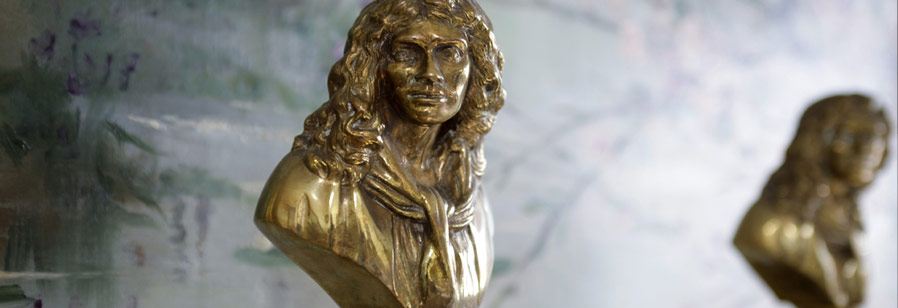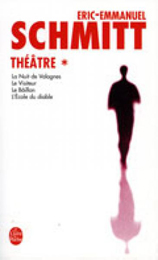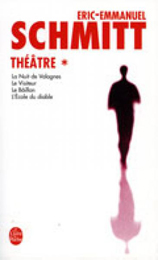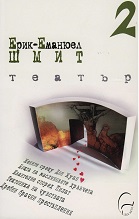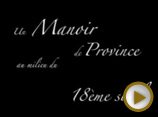Summary
The action takes place one night in a large manor-house in the middle of nowhere on the moors of Normandy. Don Juan is going to be tried by five women. They are all his former lovers and victims and they all want him to marry his latest conquest. Oddly enough, Don Juan agrees. Has life finally caught up with him?
Has the myth come to an end?
Comments
« My first play... »
My first play... There is always something of a miracle about a first time. The first time opens your eyes to the person you really are. You learn something invaluable. You become confident in your destiny. The first time is a farewell to your childhood. A new cycle begins; the life to come lies ahead of you. When a first time is a success, it even traces the course of your destiny. But there is always something false about a first time. For a first time is never a first time whatever one may say. Before a first time, there have always been broken dreams, fruitless attempts, abortive plans, feverish hopes, restlessness, impatience, disappointments and restlessness, over and over again. Before I wrote Don Juan on Trial, in one go, when I was 29, I had filled a lot of pages.
At 16, I had understood (or made up my mind) that I was a writer. And I wrote and directed my first plays. I even appeared in them at high school. Everybody, from my fellow-pupils to the parents and teachers, agreed on one point: I was gifted. This instant recognition surprised me. I was delighted. But it forced me to be tough with myself. Since I was no longer compelled to seek approval in the microcosm in which I was living, I started to ask myself frankly what I thought of my attempts. When I compared them to the old or modern classics I was devouring at that time, I was of course disappointed and I decided I would wait and learn.
My diagnosis was very simple: I already had a lot to say but nothing to communicate. All the texts I had scribbled before Don Juan on Trial and up to my first novel, for instance, The Sect of Egoists, could be compared to a singer or dancer's exercises: a mere technical rehearsal before the real performance. When I was about 28 and had completed my emotional and philosophical education, I knew, at last, what I had to say, what my themes and obsessions were; I had discovered the delicate balance that would be mine: from that moment on, doubt would be my motto.Don Juan on Trial is how I personally see Don Juan - just as I gave my own interpretation of Casanova, in The Libertine, behind the mask of Diderot. Don Juan is always on the move and he wants to be stopped. He gets carried away by desire and wants to fall in love to cast anchor. But such an equation is impossible.
To surrender to one's impulses breaks down the other person's resistance. Once Don Juan has won, he is left with nothing: neither the impulse nor the other person. Don Juan does not know what pleasure is, since his one aim is conquest. If he could feel interested in his delight and not only in his desires, he would know what experiencing intense pleasure really means. He could stop the passing of time and he could spend the rest of his life in a voluptuous ecstasy. But Don Juan thinks like a soldier, he is a conqueror and nothing but a conqueror.
He doesn't feel anything orgasmic during an orgasm. He just feels freed from certain tensions. Once his desire has been fulfilled, he waits for the next desire to arouse, which will also be satisfied once it is fulfilled. Don Juan's life is focused on sex and yet he has never understood what sex is really about. For him, sex is only the egocentric fulfilment of his urges. He never even notices all the doors he could open, the way that would lead him to pleasure, to the other person, to mutual sensual delight, to a sentimental journey. Although Don Juan is always on the move, he goes round in circles. Since he only follows his impulses, he is condemned to endless exhaustion. His adventurous life becomes inept and boring. So, I enjoyed myself interfering with Don Juan's schemes.
In the 17th- and 18th-century literature about him, Don Juan is always punished by the commendatore. Rather than an angry and resentful God out of the Old Testament, I imagined a more loving and affectionate son, too loving maybe, a character who would be at the same time Christlike and perverse. So here is Don Juan's real punishment: to fall in love with a man, when he has been looking for love everywhere, for so long and so mistakenly, under women's petticoats. Does this extraordinary love reveal any hint of unspoken homosexuality?
Some psychologists have suggested that 'donjuanism', this perpetual but never-satisfied desire for more women, may, in a virile way, hide a latent homosexuality and reveal an ambiguous cult of man. I leave them the responsability for this explanation, because that's not what ultimately interests me. For me, the most important thing is to make the distinction between sex and love. Love is asexual. Love can come to light and bloom in sexuality. But love can exist without being sexual. The fondness one has for another person, the constantly renewed fascination for him/her and for this person's mysteries, one's devotion, all this has little to do with two bodies touching each another. Although it can be very enjoyable. So, In Don Juan on Trial, you can already find the themes I later took up again in Enigma Variations.
Thanks to Jean Luc Tardieu, Don Juan on Trial was first staged in 1991. I was as enchanted as a child looking at a Christmas tree. With that play, I went to my first opening night. Then, a hundred performances later, I went to my first last performance. I felt so desperate that I swore I would never see the play again. And yet, it is still performed by small professional companies as well as by many non-professional ones. Over the years, they have invited me hundreds of times, and so nicely, but I always refused the offer, until a few weeks ago when there was a tribute to my work. I had to see Don Juan on Trial again. I was surprised because I discovered its qualities and also some of its minor defects. For a moment, I thought these defects should be corrected. Then I saw myself as the 29-year-old I was when I had just finished writing my first play. This young man would surely hate the 40-year-old successful playwright I have become for correcting his play. Out of sheer respect for that young man, I've refrained from doing so.
London, Great-Britain, 28 may 2000.
Eric-Emmanuel-Schmitt
Reviews
Ouest France - « Don Juan On Trial »
It was no disappointment: Don Juan on Trial, Schmitt's first play directed by Jean-Luc Tardieu, delighted the 800 privileged persons who managed to obtain tickets to attend its opening at the Espace 44 on Tuesday evening. On the face of it, another version of the Don Juan myth seems hardly promising, but the playwright has avoided all the traps. And very successfully, too, combining a thoroughly original approach with witty lines and a style and artistery that are sure to become a talking point. Behind the catch-phrases, which could well become quotations, lies a philosophy, a style, a quality and a genuine passion for words.
Jean Thiéfaine
Presse Océan - « Don Juan On Trial »
On Tuesday evening, after the opening night of Don Juan on Trial, Jean-Luc Tardieu the play's director, kept repeating: "A playwright is born." How right he was.Eric-Emmanuel Schmitt's Trial is a total success. Schmitt belongs to the happy few whose writing manages to express the impulses of the human heart. When the curtain fell on the first night of his play, in time-honoured fashion, the young playwright appeared in a handsome green jacket; he was nearly as green himself, but he has nothing to worry about. In his Don Juan on Trial, Schmitt has succeeded in sketching characters, weaving an intrigue, holding the audience's attention and giving them the chance to ponder the few topics worth thinking about in the course of lifetime, ie, Love and God. What is more, Schmitt has a talent for choosing the mot juste and handling witticisms, not just for the sake of frivolity, but more importantly, to entice his audience to swallow a bit of philosophy.
Paris-Match - « Don Juan On Trial »
It has always been said that Don Juan did not like women. It has often been rumoured that the only person he really loved was himself. But no one ever dared suggest he might have loved another man, or that he might have been naturally inclined towards men. Such is the provocative, iconoclastic idea that Schmitt proffers with equal amounts of talent, fun, elegance and sensitivity.More astonishing still: this is his first play. The scene is set in an 18th-century chateau in Valognes. Don Juan has fallen into a trap. Five of his former female victims have come to an agreement (a most difficult task it has been, too) to bring him to trial. Don Juan has to make a choice: either he goes to the Bastille or he must marry one of his victims. The seducer remains a cynic but he is also a man in despair, and he thus manages to invalidate the sentence delivered by this all-female, special court by confessing his secret: what he felt for his last victim was fake. It was never her he was in love with but her brother, now dead, and whose eyes she has. Don Juan will walk away a free man. How can you punish a Don Juan, who is no longer Don Juan now that he has begun to tell the truth?The dialogue is brilliant, almost too brilliant, and full of humorous flourishes. The actresses are superb, including Micheline Presle, so regal in her outfit of purple satin, and most of all, Daniele Lebrun, so perfectly mischievious. Not to forget Marie-Christine Rousseau. Some beautifully designed sets and costumes: a well-nigh perfect evening.
Figaro Magazine - « Don Juan On Trial »
The decor is elegant, the costumes are sumptuous, the dialogue sparkles and when the curtain rises, we are already seduced. From the start, we are thrilled and eager to know why these five women have met. The first lady is quick-witted, the second as excited as a nun on leave, the third has the high-and-mighty airs of an Amazon while the fourth has the modest manners of an intimidated bourgeoise with a handle to her name. The scene takes place in the 18th century in the Duchesse de Vaubricourt's drawing-room. All these women are Don Juan's former victims ready to get their revenge. They have invited Don Juan and he has accepted their invitation. They are going to try him. Schmitt can give life to his characters with the stroke of the pen and a quick flash of wit. The best woman is undoubtedly the Countess de la Roche-Piquet, played by mischievous-eyed Daniele Lebrun. She is played as a sort of elegant Calamity Jane dressed in lace and silk and with a sharp and devastating sense of humour. Mlle de la Tringle, an author of successful love-stories, is another brilliant figure. Delphine Rich, whose stiffness is shattered by whimsical flights of fancy, shows considerable daring in some hilarious situations, even to the point of looking ugly. The nun, played by Marie-Christine Rousseau, is engagingly refreshing. All of them receive their orders from the mischievously dictatorial Duchess played by Micheline Presle. Jean-Luc Tardieu's splendid direction has created a magnificent production from this evenly-talented cast. Faced with these women, Mathieu Carriere plays an elegant and ambiguous character whom the playwright has shrouded in mystery. For Don Juan has changed, and if you wish to know why and how, you must go and see the play. Brilliantly constructed, written and acted. Who would not be a witness at such a trial?
Marion Thébaud
Les Echos - « Don Juan On Trial »
What a nice idea: a new playwright with a supremely elegant style. His name is Eric-Emmanuel Schmitt and he is a former student of the Ecole Normale Supérieure in Paris, a philosopher and university lecturer who has now presented us with his first play, a successful up-date of the myth of Don Juan. Far from perverting it or overburdening it with philosophy, he offers laughter and surprise, enthralling his audience with a daring reversal of the situation that suddenly makes Don Juan look more human and brings him closer to us.
Annie Copermann
Pariscope - « Don Juan On Trial »
The ideal cast for a perfectly successful production. Don Juan on Trial, very much in the style of the 18th-century "marivaudage" (sophisticated banter in the style of Marivaux), is Eric-Emmanuel Schmitt's first play and it is full of wit, humour and grace. The playwright is a fortunate young man and you will no doubt soon be hearing a lot from him, for he is full of plans for both screen and stage.
Arlette Frazier
T.D.C. 596 Actualités - « Don Juan On Trial »
The play is skilfully plotted and a curious combination of fun, psychology, wit and philosophy.
Armelle Héliot
Le Canard Enchaîné - « Don Juan On Trial »
A delightful variation on the theme of Don Juan (...) Eric-Emmanuel Schmitt is the sort of playwright we can count on to repopulate the French stage from which so many disgruntled writers walked away a good twenty years ago. His dialogue is witty and sparkling. Bernard Thomas
Bernard Thomas
Madame Figaro - « Don Juan On Trial- Novembre 1991- »
For years, the Comédie des Champs Elysées was Jean Anouilh's private kingdom. Jouvet created Jean Giraudoux. Let us wish a long and happy career to the young playwright, Eric-Emmanuel Schmitt.
Jean-Claude Brialy
Publications
- In French language, published by Albin Michel and Livre de Poche: Théâtre vol:1
- In English language, published by Methuen.
Stage Productions
- Argentina
Buenos Aires, 2003 - Belgium
Brussels, Théâtre Royal du Parc, November 2005 - Bulgaria
Translation by Snéjina Roussinova-Zdravkova
Sofia, Regional Theater of Vratza, 2005 - Estonia: DON JUANI ÖÖ
Translation by Inge Eller
Tallinn, Ugala Theater, 2003 - France
Loire Atlantique, Maison de la culture, 1991
Nantes, Espace 44, 1991
Paris, Comédie des Champs Elysées, 1991
Saint Brieuc, Royal Theater, 95/96
Avignon, Paris-Théâtre Silvia Monfort et tournée, Directed by Régis Santon, 2007, 2008, 2009 - Japan
Translation Hitoshi Uyama
Tokyo, Theater 21, 2004 - Poland: Noc z Don Juanem
Translation by Barbara Grzegorzewska
Warszawa, Theater Ateneum, 2001 - Russia
Translation by Irina Prokhorova
Novosibirsk, Krasnoï Fakel, 2005
St Petersburg, Dramatic Theatre 03-04
Moscow, Theatre of Roman Viktyuk 05-07 - Spain: El process a Don Juan
Translation by José Maria Capilla
Tarragona, International Theater Festival, 1995
Barcelona, Companya Avinyo - French-speaking Switzerland
Cologny, Théâtre du Crêve-coeur, 2004 - UK : Don Juan on trial
Translation by Jeremy Sams: Don Juan on trial, Methuen editions
Stratford-on-Avon, Royal Shakespeare Company, January 1996
Colchester, Mercury Theater, May 1999 - USA : Don Juan on trial
Translation by Jeremy Sams: Don Juan on trial, Methuen editions
Milwaukee Repertory Theater, March 1995
